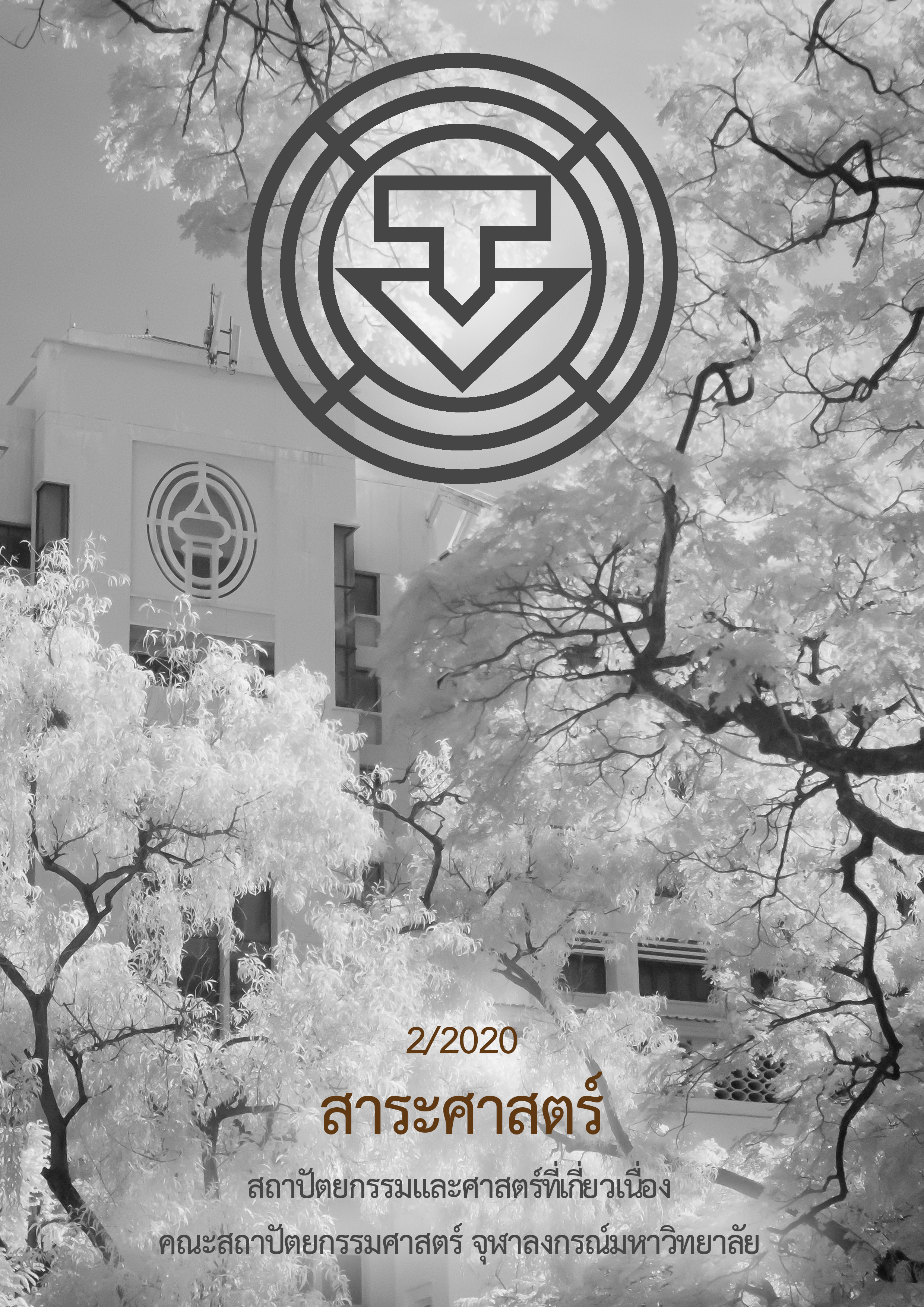โอกาสและข้อจำกัดในการนำแนวคิด “เกษตรในชุมชน” เพื่อฟื้นฟูชุมชนที่อยู่อาศัยของการเคหะแห่งชาติ กรณีศึกษา โครงการเคหะชุมชนคลองจั่น
Main Article Content
บทคัดย่อ
โครงการเคหะชุมชนคลองจั่น เป็นโครงการที่อยู่อาศัยสำหรับผู้มีรายได้น้อยของการเคหะแห่งชาติ มีอายุการใช้งานอาคารมากกว่า 40 ปี การเคหะแห่งชาติพบว่า สภาพแวดล้อมทางกายภาพของเคหะชุมชนคลองจั่นยังไม่เป็นระเบียบเรียบร้อย อีกทั้งขาดพื้นที่ส่งเสริมการทำกิจกรรมร่วมกันในชุมชน และสภาพแวดล้อมที่ยังไม่ส่งเสริมคุณภาพชีวิตของผู้อยู่อาศัย งานวิจัยนี้เป็นงานวิจัยที่มุ่งเน้นศึกษาความต้องการในการปรับปรุงสภาพแวดล้อมของผู้อยู่อาศัยในเคหะชุมชนคลองจั่นด้วยแนวคิด “เกษตรในชุมชน (community garden)” และวิเคราะห์โอกาสและข้อจำกัดในการพัฒนา และเป็นข้อเสนอต่อการเคหะแห่งชาติเพื่อนำไปพัฒนาและปรับปรุงแผนการพัฒนาชุมชนต่อไป
จากการศึกษาพบว่า (1) ด้านลักษณะทางกายภาพ มีโอกาสในการปรับปรุงฟื้นฟูพื้นที่บริเวณด้านหน้าอาคารและรอบอาคาร เพราะเหมาะสมต่อการปลูกพืชเพื่อทำเกษตรในชุมชน และพบข้อจำกัดในเรื่องพื้นที่นั้นเป็นกรรมสิทธิ์ของการเคหะแห่งชาติที่ต้องมีการสร้างข้อตกลงระหว่างคนในชุมชนกับการเคหะแห่งชาติในการใช้พื้นที่ฟื้นฟู (2) ด้านผู้อยู่อาศัย ผู้อยู่อาศัยในเคหะชุมชนคลองจั่นมี 2 กลุ่ม ได้แก่ เจ้าของห้องและผู้เช่าช่วง ซึ่งโดยส่วนใหญ่แล้วเป็นผู้สูงอายุที่มีอายุมากกว่า 60 ปีขึ้นไป ผู้อยู่อาศัยทั้ง 2 กลุ่ม มีทัศนคติที่ดีต่อการนำแนวคิดเกษตรในชุมชนมาปรับปรุงพื้นที่ แต่ยังขาดความรู้ความเข้าใจเรื่องการทำเกษตรกรรม และการบริหารจัดการทางการเงิน คนในชุมชนมีความต้องการให้มีการจัดตั้งวิสาหกิจชุมชนหรือผู้นำชุมชนเข้ามาช่วยเหลือดูแลรับผิดชอบ และมีความจำเป็นที่จะต้องนำเสนอความต้องการ แผนการปฏิบัติงาน และความพร้อมในการพัฒนาต่อการเคหะแห่งชาติ และภาคีอื่น ๆ ในการขอสนับสนุนและผลักดันให้การทำเกษตรในชุมชนเกิดขึ้นในเคหะชุมชนคลองจั่น
ผลการศึกษาชี้ให้เห็นว่า ด้านลักษณะทางกายภาพ และความต้องการมีโอกาสในการพัฒนาอยู่มาก คนในชุมชนรับรู้ถึงปัญหาของชุมชนที่ตนอาศัยอยู่ แต่ยังมีข้อจำกัดในเรื่องขาดการชี้นำและการให้ความรู้ความเข้าใจในเรื่องเกษตรกรรมและการบริหารจัดการ รวมไปถึงความพร้อมในการรับผิดชอบพื้นที่ที่ได้รับการฟื้นฟู แม้การทำเกษตรในชุมชนจะเกิดขึ้นได้ แต่ไม่สามารถอยู่ได้อย่างยั่งยืน
Article Details
เอกสารอ้างอิง
คณะผู้ศึกษา ภาควิชาเคหการ. โครงการสัมมนาเชิงปฏิบัติการ ภาพรวม 3 ทศวรรษ การพัฒนาที่อยู่อาศัยสำหรับผู้มีรายได้น้อยในประเทศไทย. กรุงเทพมหานคร: คณะสถาปัตยกรรมศาสตร์ จุฬาลงกรณ์มหาวิทยาลัย, 2552.
ณัฐพล คุณดิลกกาญจน์. "โอกาสและข้อจำกัดในการนำเกณฑ์ชุมชนน่าอยู่น่าสบายอย่างยั่งยืน (Eco Village) มาใช้กับการพัฒนาโครงการที่อยู่อาศัยของการเคหะแห่งชาติ." วิทยานิพนธ์ปริญญามหาบัณฑิต ภาควิชาเคหการ คณะสถาปัตยกรรมศาสตร์ จุฬาลงกรณ์มหาวิทยาลัย, 2558.
ธนยศ สุมาลย์โรจน์และฮานานมูฮิบบะตุดดีน นอจิ สุขไสว. "ผู้สูงอายุในโลกแห่งการทำงาน: มุมมองเชิงทฤษฎีทางกายจิตสังคม." วารสารปัญญาภิวัฒน์ (มกราคม-เมษายน 2558 ): 242-254.
บุญเลิศ จิตตั้งวัฒนา. อุตสาหกรรมการท่องเที่ยว. กรุงเทพฯ: มหาวิทยาลัยธรรมศาสตร์, 2548.
พรทิพย์ สุขวัฒนาพร. หัวหน้าฝ่ายบริหารชุมชน1. สัมภาษณ์, 27 พฤศจิกายน 2562.
พัสรินณ์ พันธุ์แน่น. "การพัฒนาสวนเกษตรชุมชนเมืองกับการเสริมสร้างชุมชนเข้มแข็ง: กรณีศึกษา ชุมชน พูนทรัพย์ เขตสายไหม กรุงเทพมหานคร." วารสารร่มพฤกษ์ 36, 3 (กันยายน-ธันวาคม 2561): 68-95.
สกาย ศิรสิทธ์วัฒนา. "แนวทางการออกแบบและปรับปรุงสภาพแวดล้อมการอยู่อาศัยสำหรับผู้สูงอายุในอาคารแฟลต โครงการที่อยู่อาศัยของการเคหะแห่งชาติ." วิทยานิพนธ์ปริญญามหาบัณฑิต สาขาวิชาสถาปัตยกรรม คณะสถาปัตยกรรมศาสตร์และการผังเมือง มหาวิทยาลัยธรรมศาสตร์, 2558.
อุทัย ปริญญาสุทธินันท์. การจัดการชุมชน. กรุงเทพมหานคร: สำนักพิมพ์จุฬาลงกรณ์มหาวิทยาลัย, 2562.
SDGs. "เป้าหมายการพัฒนาแห่งสหัสวรรษ Sustainable Development Goals (SDGs) ฉบับเต็ม." สืบค้น 23 พฤศจิกายน 2562. http://e-plan.dla.go.th/activityImage/ 422.pdf.
McHarg, I. Design with Nature. Washington D.C.: The Conservation Foundation of Washington D.C.,1967.
Pawel, Karolina, S. “Urban Farming: The Ecological, Spatial and Social Factors of Urban Landscape Transformation.” Economic and Regional Studies 11 (March 2018): 67-76.
Poulsen, M. N., R., Neff and P. J., Winch. "The Multifunctionality of Urban Farming: Perceived Benefits for Neighbourhood Improvement." Local Environment: 1-17. Accessed November 20, 2019.


